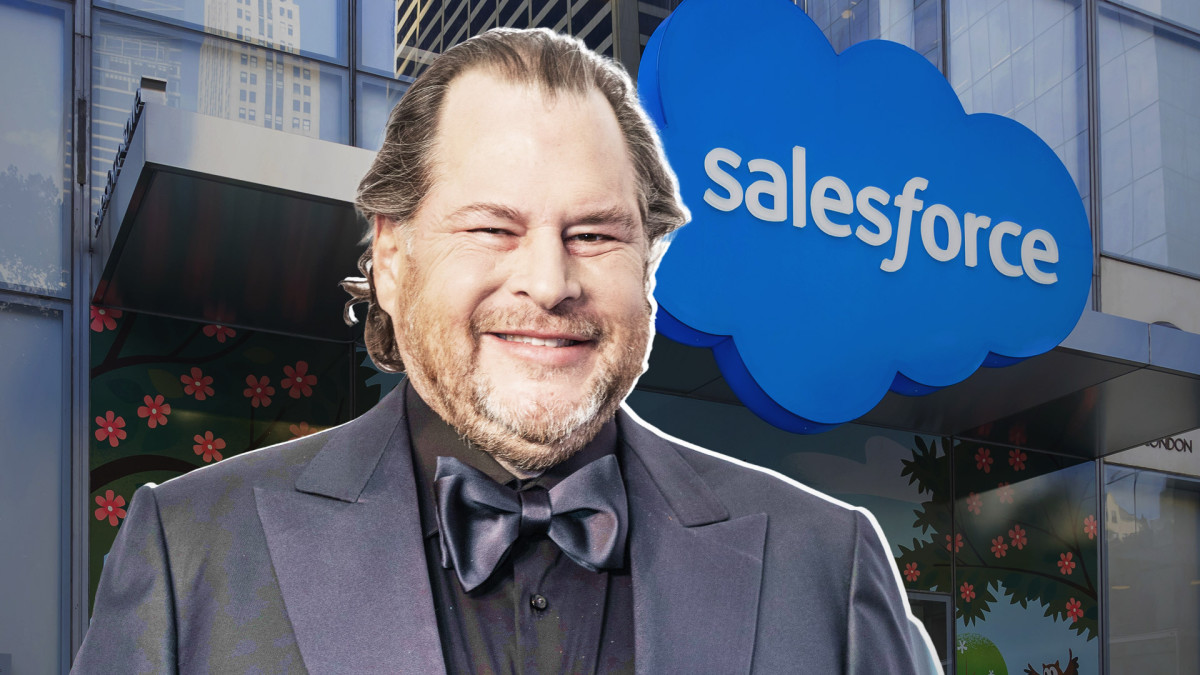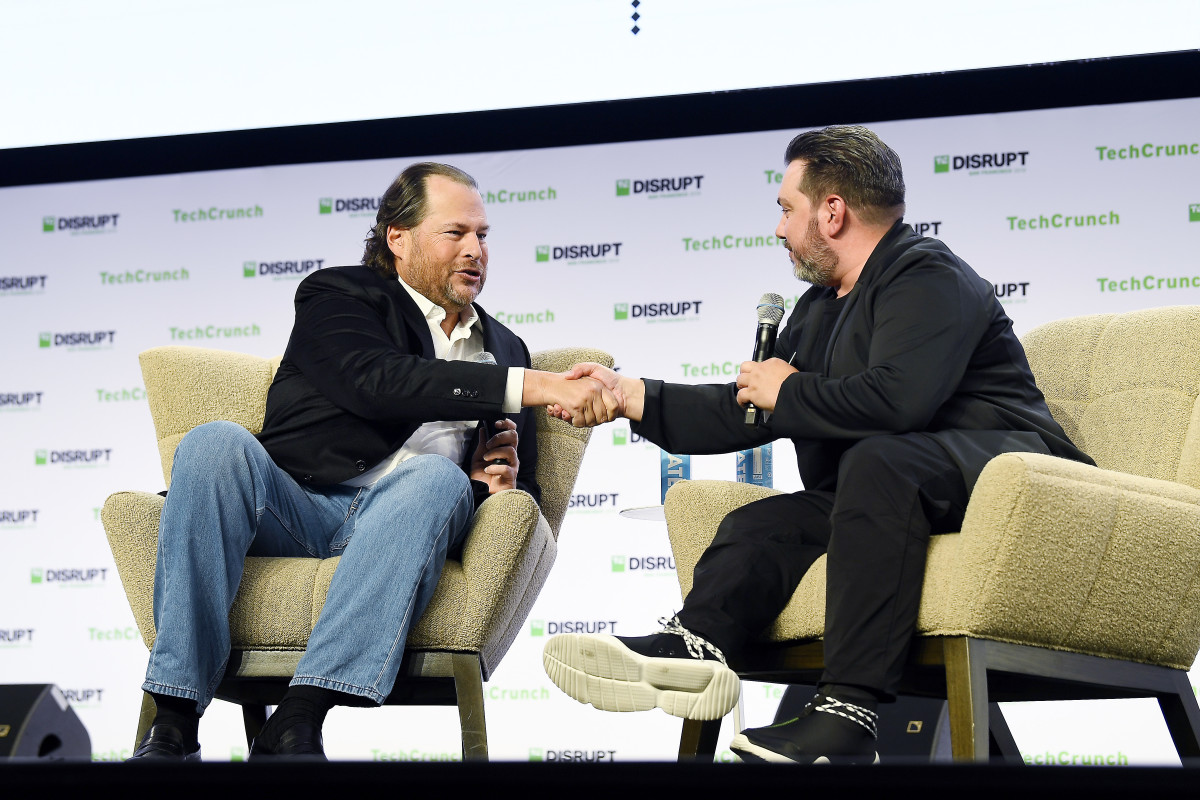
Marc Benioff, Salesforce CEO and celebrated cloud-based software trailblazer, has amassed a multi-billion-dollar net worth over the course of his 35+ year career in technology.
First at Oracle under then-CEO Larry Ellison, and later at the helm of his own digital software empire, Benioff has been making waves — and money — in business and tech for decades.
But just how much is he worth today? What is his salary as Salesforce helmsman? And how does he spend and invest his considerable wealth?
Related: W. Craig Jelinek’s net worth: How much Costco’s retired CEO made at the big-box chain
Who is Marc Benioff & what is Salesforce?
Best known for revolutionizing the corporate software industry by pioneering the subscription-based, cloud-hosted model (now called “software as a service,” or SaaS) that largely replaced the CD-ROM software products dominant in the early aughts, Marc Benioff is one of the biggest names in business technology.
Salesforce (CRM) -), his customer relationship management (CRM) software company, used the motto “the end of software” in its early days in a bid to differentiate itself from competitors like Seibel, which sold sales software in physical form.
Before Salesforce, most CRM software had to be physically installed on every device that needed it. Salesforce’s digital platform allows companies of all sizes to manage new and existing customer relationships — from lead generation to marketing and sales to customer service — via one dashboard accessible from any internet-connected device, with no installation required.
By selling subscription-based CRM software hosted online, Benioff’s company quickly grew into one of the most popular sales and marketing platforms among American businesses.
Between his time at software giant Oracle (ORCL) -) prior to founding his own business, his appointment to President Bush’s Information Technology Advisory Committee, his acquisition of Time magazine, and his almost quarter-century-long captainhood of Salesforce (not to mention his books and philanthropy), Benioff has worn more hats than most tech CEOs over the course of his career.

What is Marc Benioff’s net worth?
As of early January 2024, Benioff’s net worth stood at around $9.4 billion, making him one of the 300 richest people in the world at the time. Much of his wealth comes from his approximately 2.5% stake in Salesforce; his 24 million shares were worth approximately $6.3 billion as of Jan. 9, 2023.
A real-time capture of the value of Benioff’s Salesforce holdings (as reported in a Jan. 9, 2024, SEC filing) is available here.
Benioff’s net worth is staggering, but it pales in comparison to that of his long-time mentor, Oracle cofounder Larry Ellison, whose $134 billion net worth exceeds Benioff’s more than 14-fold.
What is Marc Benioff’s salary as Salesforce CEO?
Benioff’s 2023 compensation totaled $29.9 million, comprising $1.55 million in base pay (a number that has been constant since 2020), around $2.17 million in bonuses, about $24 million in equity and option awards, and approximately $1.5 million in other compensation (including retirement contribution matching).
This represents an over $ 1 million increase compared to 2022, during which Benioff earned about $28.6 million.
Benioff’s sky-high compensation is about 150 times higher than the median earnings of all Salesforce employees. Oracle CEO Safra A. Catz, by comparison, earns about 61 times the median compensation of his company’s employees.
Despite this staggering compensation disparity between CEO and rank-and-file employees, Salesforce is well known for its equal pay initiatives as far as gender and race are concerned. Since 2015, the company has conducted “equal pay assessments” in order to close any unexplained compensation gaps between employees in similar roles that could be due to characteristics like sex or ethnicity.

(Photo by Steve Jennings/Getty Images for TechCrunch)
How has Salesforce performed under Benioff?
Salesforce is Marc Benioff’s brainchild, and he’s been at its helm since its 1999 inception, so it’s difficult to put the company’s performance under his leadership in a broader context, as no such context exists. For all intents and purposes, Benioff is and has always been the primary decision-maker at the sales-software juggernaut.
That being said, in the context of American tech companies at large, Salesforce — with Benioff at the helm — has clearly been extremely successful. After navigating the implosion of the dot-com bubble (albeit with a 20% workforce reduction in 2000), the company went public at a split-adjusted $2.75 per share in 2004 (the actual IPO share price was $11, but the company conducted a 4:1 stock split in 2013).
In 2008, Forbes listed Salesforce as one of the fastest-growing technology companies in the world, and in 2012 — the same year it surpassed 100,000 customers — Forbes dubbed it the most innovative company in the world as well. In 2015, Salesforce finally broke into the ranks of the Fortune 500, and in 2016, Forbes named Benioff “the decade’s top innovator.”
2023 marked Salesforce’s 10th year as the world’s top CRM service provider by market share, and as of early 2024, the company’s stock was trading at around $261 per share — marking a more than 6,500% increase in value in the two decades the company has traded on the NYSE, the world’s largest stock exchange.
Was Benioff born wealthy?
Marc Benioff was certainly born into privilege, but his family’s wealth, although considerable, was nowhere near as stratospheric as his would later become.
Benioff’s family lived in San Francisco for at least three generations before him, and they were firmly cemented in the bay city’s upper echelons by the time Marc was born. His grandfather, Marvin Lewis, was a prominent trial attorney and served as a member of San Francisco’s Board of Supervisors during the era when the BART public transportation network was in its infancy. His father, Russel Benioff, grew up in the apparel industry, working at his parents’ Benioff Department Store before becoming president of an apparel brand and managing retail stores across the bay.
Like many other tech CEOs, Benioff was born wealthy but well outside of the so-called 1%, a category into which he largely launched himself, no doubt aided to some degree by the upper-class springboard from which he leaped.
Forbes gives Benioff a self-made score of eight, which the publication defines as someone who is “self-made” but comes from a “middle-class or upper-middle-class background.” A score of seven — which Forbes defines as “self-made who got a head start from wealthy parents and moneyed background” — would likely be more accurate.
What other companies does Benioff own or invest in?
While Salesforce is certainly Benioff’s proverbial baby, his dedication to his software empire hasn’t precluded him from exploring other ventures. In fact, many of his acquisitions have been conducted through Salesforce and now live under the brand’s proprietary umbrella.
Notable Salesforce acquisitions
Acquisitions have been a key part of Benioff’s growth strategy for Salesforce over the course of the company’s quarter-century-long history. Salesforce has absorbed almost 60 other companies since its inception, but the following are among its most significant (and recent) acquisitions.
| Company | Year acquired | Price | Assets/technology |
|---|---|---|---|
ExactTarget |
2013 |
$2.5B |
Targeted marketing communications software |
Demandware |
2016 |
$2.8B |
Business-to-consumer commerce and data platform |
Mulesoft |
2018 |
$6.5B |
Application-building and API network |
Tableau |
2019 |
$15.7B |
Visual data analytics platform |
ClickSoftware |
2019 |
$1.35B |
Mobile workforce-management platform |
Slack |
2021 |
$27.7B |
Cloud-based team communication platform |
Of the above acquisitions, Slack was undoubtedly the most notable in terms of price paid, media coverage, and internal importance. While the technological assets of some of the companies, like Tableau, have remained relatively untethered within the Salesforce ecosystem, Slack was acquired with immediate integration in mind.
In a 2021 interview with Yahoo Finance, while discussing the future of remote collaboration, Marc Benioff said “We're going to rebuild all of our technology, once again, to become Slack-first to help our customers have a harness to work in this new world.”
In speaking about the company’s acquisitions in general, he went on to say "I'm very excited about the future and the future of work. I think Slack will be a key part of it. I think Salesforce Customer 360 will be a key part of it. Tableau, the analytics, MuleSoft. That's why, I think, Salesforce is so well positioned and wants to be a key leader and, I think, is becoming a key leader in the future of work."
Clearly, Benioff’s vision for Salesforce extends well beyond the realm of customer relationship management. He sees his company as the world’s hub for all employer and employee corporate technology needs.
Time Magazine
One of Benioff’s most notable acquisitions outside of his company was in media — not technology. In 2018, he and his wife Lynne bought Time Magazine for $190 million with the stated goal of becoming “stewards of [the] iconic brand,” which Benioff described as a “treasure trove of … history and culture.”
At the time, the magazine was struggling financially as it continued to transition, like many legacy media brands, further into the digital space while attempting to maintain the integrity of its longstanding print edition.
Whenever a tech billionaire buys a well-known media brand (as Jeff Bezos did with The Washington Post and Patrick Soon-Shiong did with the LA Times), speculation abounds that their aim is to subtly push some sort of agenda or worldview by exerting quiet editorial control. When discussing his purchase of Time in 2018, however, Benioff assured the public that he and his wife “don’t plan to be operational or involved in editorial” and that he did not expect the iconic magazine’s content to adhere to his own social or political opinions.
Time Ventures
In 2019, Benioff borrowed Time magazine’s storied moniker to launch Time Ventures, a venture capital fund that serves as an incubator for early-stage startups that Benioff is passionate about. As of early 2024, many of the fund’s investments are in companies that deal with cryptocurrencies and other digital assets (Yuga Labs, MobileCoin, Chainalaysis, and Moonpay, among others).
Other startups funded by Time Ventures include You.com, an ad-free private search engine; Supersocial, a metaverse gaming company; and Ellipsis Health, an AI-powered mental health assessment startup.
Two of the companies Benioff’s VC firm previously invested in — Planet Labs, a global satellite imaging company that aims to monitor changes on the earth’s surface, and IonQ, a quantum computing company — have since gone public.

How does Benioff spend his money?
Details about Benioff’s day-to-day spending habits aren’t readily available, but on a broader scale, it is well-known that he has a penchant for philanthropy and periodically donates large sums to organizations he is passionate about. He also owns plenty of high-end real estate, both in the San Francisco Bay area and beyond.
Philanthropy
When he founded Salesforce in 1999, Benioff also created the Salesforce Foundation, a subsidiary with the goal of funding educational and professional development programs for young people in underserved communities. In a 2014 interview with CNET, Benioff explained that the Salesforce Foundation uses what he calls a 1-1-1 approach to philanthropy. The company donates one percent of employee time, revenue, and product to the causes the foundation supports.
Outside of the Salesforce Foundation, the Benioffs also donate large sums of their personal wealth to support charitable causes. In 2010, they donated $100 million to the UCSF Children’s Hospital, where their daughter was born two years earlier at the end of an apparently complicated pregnancy. Four years later, they donated another $100 million to the hospital plus an additional $50 million earmarked specifically for research on premature births.
In the years that followed, the Benioffs donated sums in the tens of millions to various environmental and social programs and initiatives. Next, in 2020, Benioff acquired 50 million pieces of personal protective equipment for hospitals and first responders to use during the acute stages of the Covid-19 pandemic and donated $1 million in cash to the local Give2SF Covid-19 Response and Recovery Fund.
As a result of their frequent charitable pursuits, both the Chronicle of Philanthropy and Forbes have listed the Benioffs among their roundups of top donators to charity.
Real estate
Outside of his philanthropic efforts, Benioff has also spent considerable money on several luxury homes and secondary residences. At the turn of the millennium, he spent $12.5 million on five acres of beachside land in Hawaii, which he developed into a custom, six-bedroom compound over the course of the years that followed using a construction company he launched for that sole purpose.
At his sprawling Hawaiian estate, Benioff keeps a unique vehicle known as a Gibbs Quadski XL — an all-terrain amphibious craft that can drive on land or water — that sells new for between $40,000 and $50,000.
Benioff also owns several homes around the San Francisco area, including a luxury mansion on a stretch of Broadway Street in the Pacific Heights neighborhood known colloquially as “Billionaires’ Row.” He reportedly also has a home in the city’s Presidio Neighborhood near the Golden Gate Bridge.







